Success at retail is less about WHAT you sell and more about HOW you sell it!
A shop that POPs! is simply irresistible to customers. It’s a special destination that engages the customers in such a way to make them feel special too. It magnetically attracts shoppers, made curious about the special experiences and things they will find there. A shop that POPs! keeps its focus on attracting shoppers who have discretionary income and willingness to spend it on the special things they find in the store.
What makes a shop that POPs! so special is that it puts the customer first. It is staffed with energetic, happy people who are knowledgeable, well trained, and make delighting the customers their first priority. It presents a carefully curated range of merchandise and displays it to the delight of the customers. It’s a store that consistently presents an image and environment that makes the customers feel they have found a home away from home. It’s what every retailer aspires their store to be.
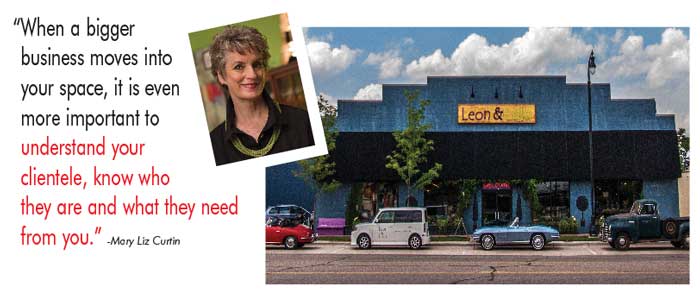
My new book, Shops that POP! 7 Steps to Extraordinary Retail Success, shows retailers, large and small, how to make their shop POP! too. It’s filled with case studies of stores that work the POP! magic, and presents hundreds of ideas for retailers to put to work immediately in their stores. The most important thing retailers need to understand is that success in retail today is less about WHAT they sell, and more about HOW they sell it.
Take the lifestyle and furniture store Leon & Lulu, located in Clawson, Michigan, a Detroit suburb, under the direction of Mary Liz Curtin and her husband and business partner Stephen Scannell. I recently sat down with Mary Liz to understand the secret of Leon & Lulu’s success.
Every retailer has their special challenges when it comes to delivering their special POP!, but furniture stores even more so, with their relatively high-priced offerings and the challenge of irregular, infrequent customer purchases. “So many people are terrified about buying furniture,” Mary Liz explains. “They will spend $50,000 on a car that they will be paying on every month for years. But when they come in to buy a sofa for far less money, they have a complete meltdown.” The difference, she explains, “Cars are pervasive, we talk about them all the time, but furniture, once you have it, you don’t think about it again. Most people buy a car every couple of years, but for a sofa, it may every 7-10 years or longer. They are scared of furniture sales people and they don’t really know who to trust.”
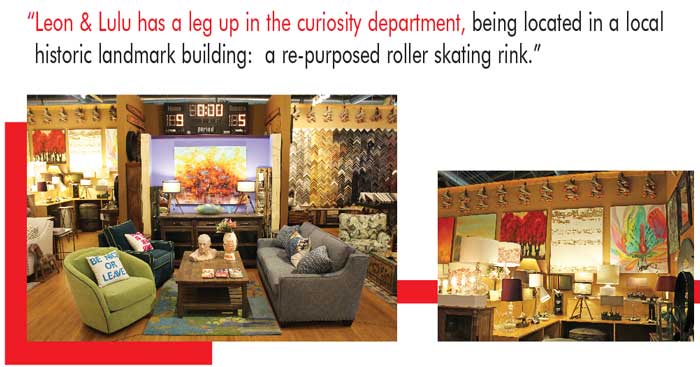 Leon & Lulu Magic
Leon & Lulu Magic
Leon & Lulu has found the way to overcome fear of furniture buying by getting customers to feel comfortable. They engage customers by addressing each customer’s lifestyle and special needs first, before turning the discussion to the furniture on the sales floor. “We start every interaction with a chat. We ask about their lifestyle, whether they have pets or children, and if they eat dinner on their sofa. We try to understand all those things to guide them to the right fabric, the right pieces, so that we can help them make an informed decision. They become much more confident going through the process.”
But Mary Liz’s Leon & Lulu shop doesn’t just POP! because they’ve mastered how to sell furniture. It is a unique combination of seven key factors that transform the ordinary store into a shop that POPs!
Here’s how Mary Liz Curtin has created the POP! magic at Leon & Lulu:
#1 - Highly Personal
Shops that POP! deliver a shopping environment that fully involves the shopper and engages them interactively in the shopping experience. Shops that POP! encourage customers to touch, feel, taste, try on, and participate in the store in a highly personal way.
Having the right sales staff on the sales floor is key. Each staff member is carefully trained to make a delightful customer experience their first priority. Mary Liz counsels, “Your customer base is the most important asset you have. When a bigger business moves into your space, it is even more important to understand your clientele, know who they are and what they need from you. While we ‘indies’ cannot compete on price, the relationships we build with our customers, the service we offer and the careful selection of offerings keep us in business. Whatever the size of your business, always think of your customers first. Make their experience with your business as fabulous as it can be and they will not want to leave.”
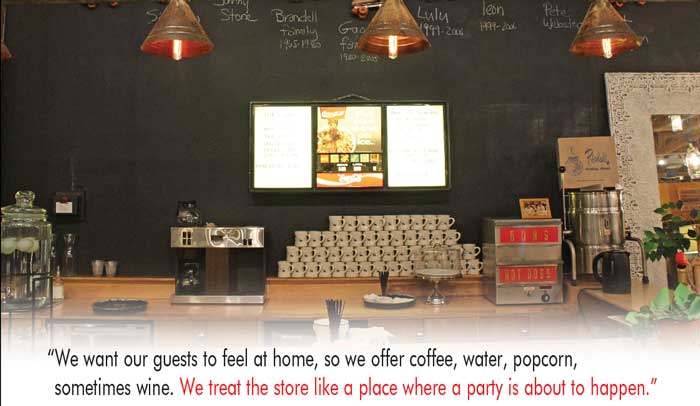
#2 - Shopper Curiosity
Shops that POP! excite consumer curiosity to explore and experience the store fully. It starts with creative shop windows and entrances, followed by imaginative and well-executed visual merchandising. Curiosity lures shoppers into the store and down the aisles to transform a buying trip into a shopping experience.
Leon & Lulu has a leg up in the curiosity department, being located in a local historic landmark building: a re-purposed roller skating rink. That sets the mood of fun and frolic in the store, which Mary Liz exploits to the max by often having store greeters work in roller skates, serving coffee, popcorn, and on weekends, warm cookies. “So it’s a really fun experience to be here,” she says. “We are in the process of doing an adaptive re-use of a second historic building that was an operating theater from 1941 to 1962. The skating rink and theater were both built in 1941, and they are right next to each other giving us a chance to increase our square footage by about 8,000 square feet. We re-created the theater marquis, a faithful reproduction of the 1941 original which had been removed. The new space will include a café. It’s all part of completing the experience for our customers. We now own the entire entertainment district of Clawson Michigan!“
People driving or walking by are drawn to come inside and satisfy their curiosity. But it goes well beyond the window displays and front door. “We feature intricate room vignettes that change constantly,” Mary Liz says. “We bring all kinds of accessories into these room-like vignettes, try to keep it moving and make it look like someone really lives there. We also show a lot of color on the floor, which makes it fun. People may order something safer, but they love to see the cheerfulness and excitement.”
Mary Liz has special advice for furniture stores: Accessorize. She says, “We are accessory heavy. Many furniture stores have the same accessories that have been kicking around for years.” Accessories add vibrancy to any room setting, and Leon & Lulu works them for all they are worth. Plus, when times got tough selling furniture back during the Great Recession, the accessories kept the store afloat. “We were lucky to have small things to balance the sales.” But today, those customers who bought the small indulgences and gifts in 2008 are back to buy big-ticket furniture,” she adds.
#3 - Contagious, Electric
Shops that POP! exude energy and excitement that is contagious. It is this quality that makes a shop a dynamic place, exciting to visit, and a thrill to be in.
Energy can’t be dialed in. It must be planned and staged, and the sales staff is its essential spark. “Our staff is always busy, moving things, folding things, doing something so it is an energetic, exciting place to be,” Mary Liz explains. Plus the staff is trained to have talking points ready when a customer comes in, avoiding the dreadful and dreary ‘may I help you?’ introduction.
“We carry lots of vintage and antique items, so it is easy to engage the customers on something interesting, not necessarily what they are here to buy, but it gives us something to talk about before we move into the real business,” she explains.
#4 - Authentic Experience
Shops that POP! present a cohesive vision that combines all the tangible and intangible elements of the store into a unified whole. These elements include atmosphere, store design and merchandise that presents a distinctive point of view that holistically ties together all the disparate elements of the store into one authentic experience.
“Leon and Lulu is a destination store so it has to be worth the trip here,“ Mary Liz observes. “And by having so many product categories, people can shop for their homes, themselves, for friends and special occasions. They have a lot of reasons to come, and plenty of things to keep them busy shopping here for several hours.
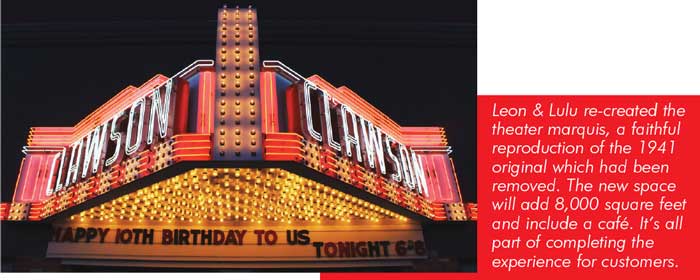
“My husband and I believe in being overstocked at all times. It isn’t a typical retail point of view, but I believe that more stores would be successful if they did that. People want to shop from a full cart.”
“We do about 35-40 percent of our volume in furniture. Being a furniture store that carries housewares, gifts and clothing has been terrific for us. Our regular customers come to us to buy the smaller categories, but when they are ready to purchase a new sofa they already know and love us.
“Last year we had more than 80 special events in this store. Leon and Lulu host an artist’s market four times each year, which is a chance for local artists to show their work. We do a girls’ night out on the first Tuesday of every month, a books and author’s event where about 50 local authors sell their books, dog adoptions, blood drives, and charity events for as many as 400 people.”
Since Leon & Lulu is a home store, they work diligently to make the store home-like too. Every single area in the store must be comfortable. Says Mary Liz, “We treat the store like a place where a party is about to happen, a social area where our guests feel comfortable and at home. When we serve in our space we let customers drink red wine and eat. We don’t care where they sit because we want them to have a good time and leave happy. That is more important to us than having them leaving with a bag in their hand.
#5 - Conceptually Driven
Shops that POP! are about more than stores selling stuff -- they are conceptually driven and reflect visionary values. The shop transcends being just a store, becoming a place for a new experience.
“Our goal is to make our customers happy and to provide them with things they need to make their homes better, happier,” Mary Liz explains. “So we put them first. If you keep your customer first, her needs and desires in mind, then the money part follows. Our whole driving force is finding things that will serve a need for customers, that they will like or that will amuse them.”
#6 - Value Proposition
Shops that POP! have a carefully constructed pricing strategy based upon offering fair value for a reasonable price. Pricing is not about how low can you go, but how much value can you offer. Pricing, therefore, hinges upon the value to the shopper, not the price tag.
Mary Liz makes delivering value to the customers a priority. “You are always going to have people who come in and say ‘that is too much money!’ Take notice of it, but also take notice of the quiet ones willing to pay the price and are actually buying,” Mary Liz advises. “People today want their money’s worth. The customer is better educated and knows more than she ever has. She is willing to pay the money for quality, so she doesn’t have to replace something in a few months or a year because it breaks. She wants to get a lifetime of value for what she is buying.”
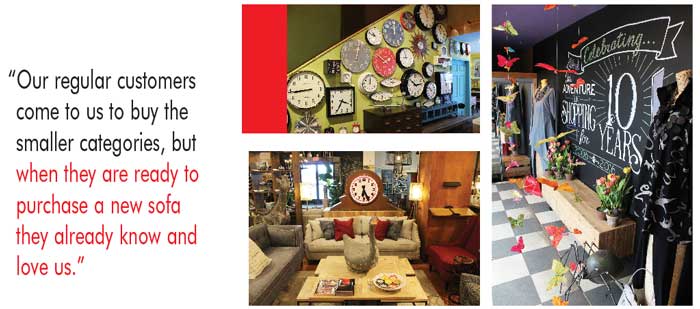
That makes communicating the quality and value in the product offerings critical to furniture store success. And that also means having a well-trained and educated staff to communicate those value messages effectively.
#7 - Immediately Accessible
Shops that POP! have all the six preceding qualities, plus another essential feature — they are immediately accessible to everyone, free from pretensions or snobbishness. They know they are good. Rather than resting on their laurels and expecting everybody else to know it too, they constantly reach out, drawing people into their web with missionary zeal and self-effacing charm.
Without a doubt, Leon & Lulu is a super-accessible, non-exclusive destination for shoppers totally free from pretensions. That is in the store’s DNA. But with such a heavy emphasis on furniture, the price points alone can be off-putting for some shoppers. That’s where being a lifestyle store, rather than just a furniture store comes into play. “In a store like ours where we have some pretty pricey stuff, to have a selection of more affordable items, $1, $5, or $10, is important. A lot of people can’t afford the $1,500 mirror, but can leave with a pillow, or a great picture frame. Offering a range of goods at all different prices lets the customer take home a part of the store as a remembrance of the fun she had, at a price point she can afford.”
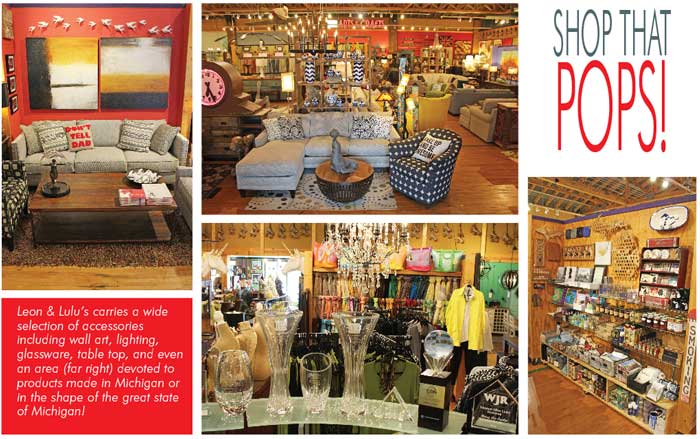
Ultimately success at retail is less about what you sell, and more about how you sell it. And Mary Liz Curtin understands that Her secret is delivering what customers really want in the in-store shopping experience – the personal touch. Mary Liz concludes, “We all are competing with online entities and other competitors offering ‘the better deal.’ But it is awfully hard to compete with one of our sales people saying ‘this is the sofa that is perfect for the way you live,’ or reassure them that it matches the carpet. That personal interaction is huge.” And it is ultimately what makes Leon & Lulu a shop that POPs!
About Pam Danziger: Speaker, author, and market researcher Pamela N. Danziger is internationally recognized for her expertise on the world’s most influential consumers: the American Affluent. Her new book, Shops that POP! 7 Steps to Extraordinary Retail Success, reveals the secrets to crafting a retail shopping experience that’s irresistible to high-value shoppers. As founder of Unity Marketing, Pam leads with research to provide brands with actionable insights into the minds of their most profitable customers. She is the author of five books including a recent mini-book, What Do HENRY’s Want?, explores the changing face of America’s consumer marketplace. Pam is frequently called on to share new insights with audiences and business leaders all over the world. Contact her at pam@unitymarketingonline.com.
Furniture World is the oldest, continuously published trade publication in the United States. It is published for the benefit of furniture retail executives. Print circulation of 20,000 is directed primarily to furniture retailers in the US and Canada. In 1970, the magazine established and endowed the Bernice Bienenstock Furniture Library (www.furniturelibrary.com) in High Point, NC, now a public foundation containing more than 5,000 books on furniture and design dating from 1620. For more information contact editor@furninfo.com.